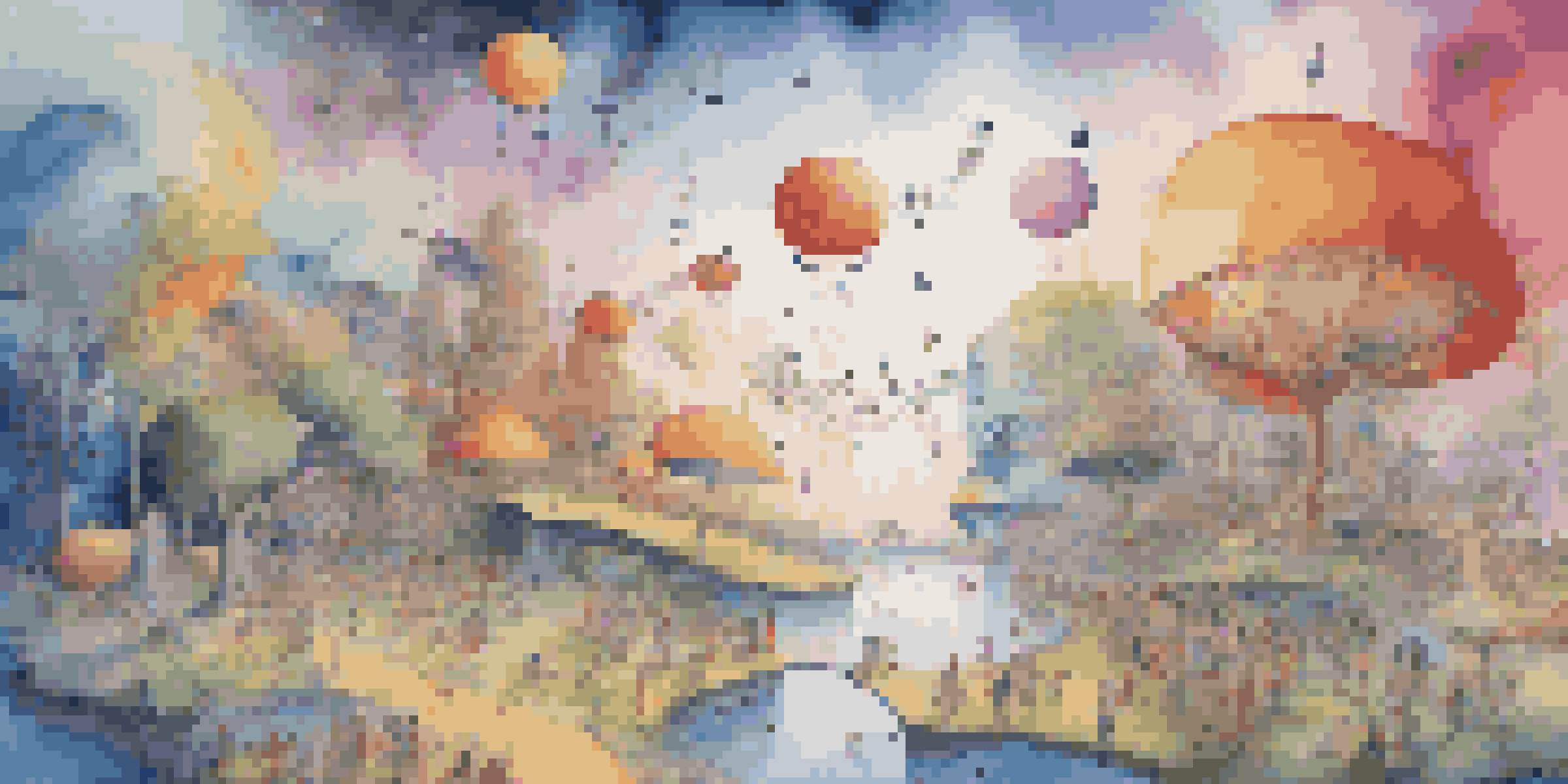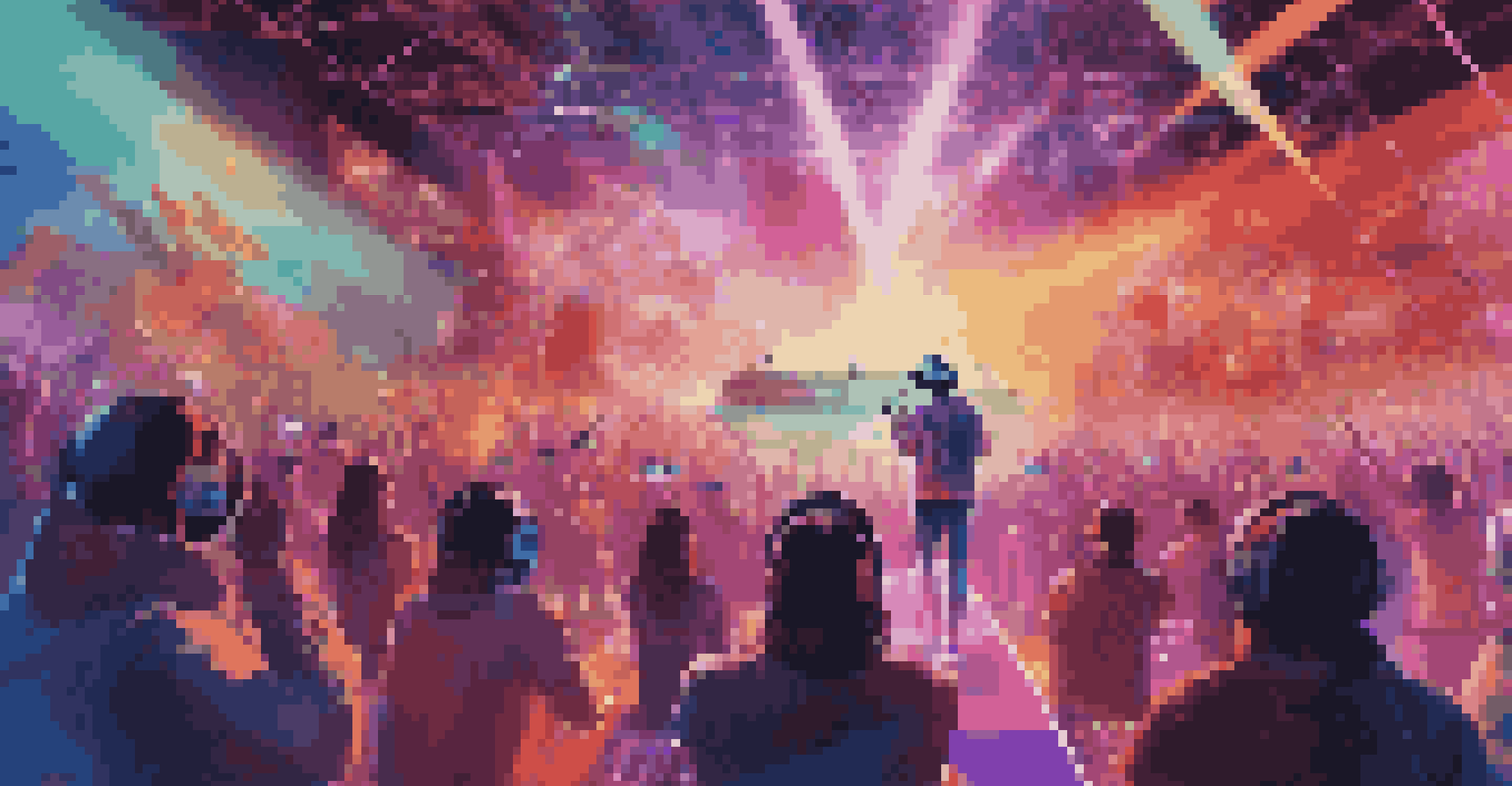Using Virtual Reality to Enhance Music Marketing Campaigns

Understanding Virtual Reality in Music Marketing
Virtual reality (VR) is a technology that creates immersive experiences, allowing users to engage with digital environments as if they were real. In the context of music marketing, VR offers an innovative platform for artists to connect with fans on a deeper level. By stepping into a virtual world, listeners can experience music in ways that transcend traditional formats, making the marketing campaign more memorable and engaging.
Virtual reality is not just a new way to experience music; it’s a new way to connect with it on a deeper level.
For instance, imagine attending a virtual concert where fans can interact with the band, explore the stage, and even influence the performance. This type of engagement not only captures attention but also fosters a sense of community among fans. As music consumption evolves, VR provides a unique avenue for artists to showcase their creativity while creating lasting impressions.
Moreover, with the increasing accessibility of VR technology, more artists are exploring this medium to differentiate their marketing strategies. As VR continues to develop, it’s crucial for music marketers to understand its potential and incorporate it into their campaigns.
Creating Immersive Concert Experiences
One of the most exciting applications of VR in music marketing is the creation of immersive concert experiences. Instead of watching a live performance from a distance, fans can feel as if they are on stage with their favorite artists. This level of immersion not only enhances the enjoyment of the concert but also creates shareable moments for fans to spread across social media.

For example, artists like Travis Scott have successfully utilized VR for virtual concerts, allowing fans from around the world to experience his music in a unique setting. These virtual events can attract a global audience, increasing the artist's reach and brand awareness. As fans share their experiences online, the marketing campaign gains organic traction.
VR Transforms Music Marketing
Virtual reality creates immersive experiences that deepen artist-fan connections and enhance marketing campaigns.
Additionally, immersive concerts can be tailored to fit specific themes or narratives, further engaging the audience. This storytelling aspect adds depth to the experience, making it not just a concert but an unforgettable journey through music.
Enhancing Fan Engagement Through VR
Engagement is key in music marketing, and VR offers innovative ways to connect with fans. Through interactive experiences, fans can participate in activities like virtual meet-and-greets or exclusive behind-the-scenes tours. This level of interaction can significantly strengthen the bond between artists and their audience.
The future of music marketing lies in creating experiences that resonate with fans, and VR offers a unique avenue to do just that.
Imagine being able to explore a virtual recording studio and watch your favorite artist create music in real-time. This kind of exclusive access makes fans feel special and valued, fostering loyalty. Additionally, engaging fans through VR can lead to increased merchandise sales, as fans are more likely to support artists they feel connected to.
Moreover, VR experiences can be gamified, turning interactions into fun challenges or competitions. By incorporating elements of play, marketers can encourage fans to share their experiences, amplifying the campaign's reach and impact.
Leveraging Virtual Reality for Album Promotions
Album promotions can benefit greatly from the immersive nature of VR. Instead of traditional listening parties, artists can host virtual launch events that allow fans to experience the album in a fully immersive environment. This not only creates buzz around the release but also engages fans in a meaningful way.
For example, an artist could create a virtual world that reflects the themes and stories of their new album, allowing fans to explore and discover the music in a unique setting. This approach can attract media attention and encourage fans to participate in discussions online, further promoting the album.
Engaging Fans with Immersive Events
Artists can host interactive virtual concerts and experiences that foster community and loyalty among fans.
Additionally, VR can be used to create exclusive content, such as 360-degree music videos that provide a more dynamic listening experience. By integrating VR into album promotions, artists can elevate their marketing strategies and stand out in a crowded market.
Using VR to Build Music Communities
Virtual reality can serve as a powerful tool for building and nurturing music communities. By creating shared virtual spaces, fans can come together to discuss music, share experiences, and connect with like-minded individuals. This sense of community is essential for artists looking to cultivate a loyal fan base.
For instance, artists can host virtual listening parties where fans can interact with each other while enjoying new music. These events not only enhance the listening experience but also facilitate meaningful connections among fans. As they share their thoughts and feelings, a supportive community begins to form.
Furthermore, building a community around music helps artists gather valuable feedback and insights from their fans. This information can inform future marketing strategies and creative directions, ultimately benefiting both the artist and their audience.
The Future of Music Marketing with VR
As technology continues to evolve, the future of music marketing with VR looks bright. Artists and marketers who embrace this innovation will likely stay ahead of the curve, offering fans unique experiences that resonate. The potential for VR to transform the music industry is vast, opening doors to new creative possibilities.
For example, advancements in VR technology could lead to even more realistic and interactive experiences. Imagine attending a virtual festival where fans can navigate through different stages, interact with artists, and enjoy a variety of performances all from the comfort of their homes. This level of engagement could redefine how fans experience music events.
Future Potential of VR in Music
As VR technology evolves, it offers vast creative possibilities for artists to engage audiences in innovative ways.
Ultimately, the key will be for artists and marketers to stay adaptable and open to experimenting with VR. By continually innovating, they can create fresh and exciting campaigns that capture the imagination of their audience.
Challenges and Considerations in VR Music Marketing
While the potential of VR in music marketing is immense, there are challenges to consider. One significant hurdle is the cost of developing high-quality VR experiences, which may not be feasible for all artists or labels. Additionally, the technology's accessibility can be a barrier, as not all fans own VR headsets.
Moreover, artists must ensure that their VR content aligns with their brand identity. If the experience feels disjointed or forced, it could alienate fans rather than engage them. Therefore, careful planning and execution are crucial to creating effective VR marketing campaigns.

Finally, as with any marketing strategy, measuring the success of VR campaigns can be complex. Marketers need to establish clear goals and metrics to evaluate the effectiveness of their VR initiatives and make data-driven adjustments as needed.